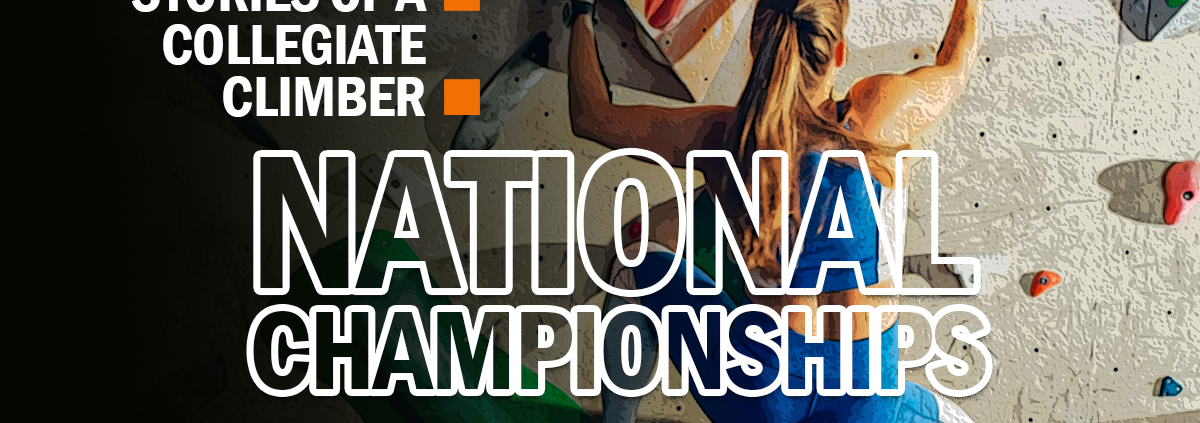Stories of a Collegiate Climber: National Championships
Pool together the top one hundred male and female collegiate climbers in the United States for a weekend of competition, and you end up with something between a house party, class reunion, and world-cup-style competition. But before I can explain how all three scenarios came under one roof, I must catch you up on how you make it to the USA Climbing Collegiate National Championships.
How To Qualify for National Championships
As a college student, you have four years of eligibility to compete in the USA Collegiate Series. This means you can participate in the series anytime during your four years of college. Although streamlined, the process will seem very similar if you were a former youth competitor. From November to March, eight divisions host collegiate qualification events (QE) in Boulder and Lead. New for the 2023-2024 season, athletes could pick whether they competed in the intermediate or advanced category for their gender. Upon completing one QE, the climber can compete in their division championship competition in April. It’s at this event where climbers receive tickets to Collegiate Nationals. Formerly, the top 13 advanced male and female athletes in boulder and lead would advance. With the addition of an intermediate category, the top five athletes in each category now qualify. However, like my story, where I qualified in the lead round at divisional championships, you can also compete in boulders and speed at nationals.
The Nationals Experience: Party meets Competition
Collegiate Nationals is a breath of fresh air, a departure from the intense competitions of the USA youth circuit. DJs set the mood with music, parents, and climbers mingle, laugh, and share pizzas, and strangers become friends, cheering you on or wishing you luck. It’s not just a competition; it’s a celebration. The atmosphere is more akin to a family barbecue than a cutthroat competition, and it’s wonderfully chaotic.
For competitors, the intensity of the weekend is what you make it. I competed in women’s advanced alongside ~100 other females in boulder and lead. However, only the top 20 for each discipline advanced to finals. With former youth champions and Team USA athletes like Nekaia Sanders among the competition, vying for a spot in the top 20 was an unrealistic goal for my skillset. Many others were in the same bost, as ending up in the top 20% when you only have one attempt per lead route and four minutes per boulder is challenging. For myself and others in the same boat, you can focus on taking down the greatest competition anyone can face: themselves. The party atmosphere and positive vibes from all parties make it a fantastic experience regardless of place. Enjoying the sets created by USA Climbing’s best setters, making new friends, or reuniting with old ones, and putting all of your training to the test culminates in an unforgettable weekend.
The Takeaways
If you have yet to gather it, I was not the strongest or most skilled competitor. In both disciplines, I placed in the bottom 40%. But did I have an exciting and fun two days? 100 percent! The journey to Nationals was long and took a lot of hard training, but at Nationals, I could focus on having fun. The routes and boulders had creative, challenging moves like funky press moves, coordination toe catches, and paddle dynos, leaving me smiling even when I fell. The energy in the gyms was electric, and the competitors, staff, and families cheering on their athletes were so kind and encouraging. One memorable light-hearted interaction occurred after my only flash of the competition. The older gentleman judging the boulder joked that he needed to confirm the number of attempts with me (it was one). I also met friends of friends, connecting over a sweatshirt I wore with the name of my home gym across the back.
If I had the chance, I’d return to Nationals in a heartbeat. I encourage you to do it if you’re considering challenging yourself to compete for a spot. You’ll gain more than just a competition experience. You’ll learn about your strengths, limits, and the power of the climbing community. College is the time to challenge yourself and have fun, so let climbing be a part of that narrative.



